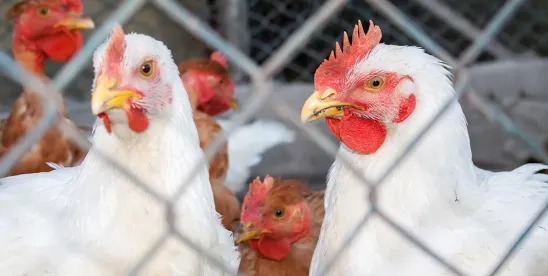The recent surge in the cost of eggs because of the avian influenza (bird flu) is impacting many consumers. Multiple grocery store chains have implemented limitations on the amount of eggs a customer can buy and restaurants have imposed surcharges on menu items with eggs. Consumers, however, are not the only ones feeling the economic impact of the ravage to poultry flocks, poultry farmers and producers are also feeling the financial strain. As we have explained in the past, insurance can help mitigate the risks to poultry farmers and producers associated with these kinds of events. Here, we explore how some types of coverages can help protect poultry farmers and producers who face unexpected events, such as those stemming from illness or contamination of a flock, that disrupt operations or cause a business loss.
Poultry-Related Risks Coverage
Poultry farm insurance is meant to protect poultry farming operations from an array of losses because of damages to equipment and property; and the death, injury or illness of the birds. Insurance products specific to poultry risks can also cover animal loss and loss of production due to diseases. Poultry insurance can also protect against unexpected mortality (like sudden death due to a farming accident or natural disaster), theft, contamination and flock repopulation costs. Insurance for poultry farmers and producers is also available in certain livestock policies, which also cover some risks associated with poultry farming.
Disease & Contamination Coverage
Disease or contamination insurance covers losses resulting from the outbreak of diseases, like bird flu and salmonella, that can affect the egg-production process. Some policies include coverage for flock culling (the process of removing birds from a flock and often later replacing them) to prevent the spread of a disease or illness within a flock. In some cases, coverage may even be available for costs of treatments for ill birds and for sanitizing a poultry farm before bringing new birds in. Disease or contamination coverage may also cover costs for poultry farmers and producers who face egg recalls and government mandates to destroy an egg supply due to contamination or suspected contamination.
Business Interruption Coverage
Business interruption coverage protects against income losses. Often, this type of insurance also covers the additional costs of keeping a business running after an interruption caused by events like supply chain issues, natural disasters and potential disease outbreaks. In some instances, business income insurance also covers lost income due to direct loss of a poultry farming operation. Some insurance offerings also protect against risk of loss due to market conditions that impact livestock businesses and owners considering events like the bird flu. For example, “gross margin” insurance policies, which are part of a federal risk-management program, protect against the loss of gross margins when costs to feed and care for animals exceeds the market value of the animals. Notably, however, business interruption coverage may require a showing of direct physical loss to insured property, which may vary depending on the policy. In this regard, insurers might also attempt to apply pro-insurer rulings from cases arising from the Covid-19 pandemic that interpret the meaning of “physical loss or damage” to limit what otherwise would have been a covered business interruption loss arising from bird flu-related issues. Instances of such insurer conduct have already been seen in cases involving smoke damage from California wildfires.
Key Takeaways
Poultry farming involves many unique risks, from disease outbreaks and egg recalls, to devastation resulting from severe weather conditions. For that reason, it is key for farmers and producers in the poultry industry to understand the various insurance products and unique elements associated with events that can impact their flocks and their finances. As a best practice, poultry businesses should assess potential risks of loss early and identify which insurance offerings can maximize their coverage options if their flock and farm operations are impacted by an event that leads to a loss.
Alundai J. Benjamin also contributed to this article.



 />i
/>i
